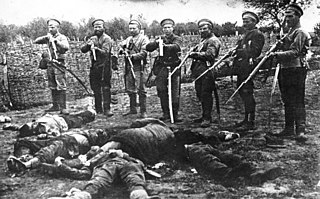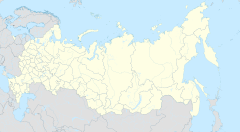
The Decembrist Revolt took place in Russia on 26 December [O.S. 14 December] 1825, following the sudden death of Emperor Alexander I.

Yuri Dmitrievich Budanov was a Russian military officer convicted for the kidnapping and murder of Elza Kungayeva in Chechnya.
Dedovshchina is the informal practice of hazing and abuse of junior conscripts historically in the Soviet Armed Forces and today in the Russian Armed Forces, Internal Troops, and to a much lesser extent FSB, Border Guards, as well as in other armed forces and special services of former Soviet Republics. It consists of brutalization by more senior conscripts, NCOs, and officers. It is a form of non-statutory dominant-status relations between military personnel; the most common form of non-statutory relations, which is a violation of the statutory rules of relations between conscripts, based on the informal hierarchical division of soldiers and sergeants by enlistment and length of service.
Elza Kungayeva was a Chechen 18-year-old woman abducted, beaten, allegedly raped, and murdered by Russian Army Colonel Yuri Budanov during the Second Chechen War.
Barrier troops, blocking units, or anti-retreat forces are military units that are located in the rear or on the front line to maintain military discipline, prevent the flight of servicemen from the battlefield, capture spies, saboteurs and deserters, and return troops who flee from the battlefield or lag behind their units.

The war crimes and crimes against humanity which were perpetrated by the Soviet Union and its armed forces from 1919 to 1991 include acts which were committed by the Red Army as well as acts which were committed by the country's secret police, NKVD, including its Internal Troops. In many cases, these acts were committed upon the orders of the Soviet leaders Vladimir Lenin and Joseph Stalin in pursuance of the early Soviet government's policy of Red Terror. In other instances they were committed without orders by Soviet troops against prisoners of war or civilians of countries that had been in armed conflict with the USSR, or they were committed during partisan warfare.
Human rights violations were committed by the warring sides during the second war in Chechnya. Both Russian officials and Chechen rebels have been regularly and repeatedly accused of committing war crimes including kidnapping, torture, murder, hostage taking, looting, rape, decapitation, and assorted other breaches of the law of war. International and humanitarian organizations, including the Council of Europe and Amnesty International, have criticized both sides of the conflict for blatant and sustained violations of international humanitarian law.

The Russian conquest of Siberia took place during 1580–1778, when the Khanate of Sibir became a loose political structure of vassalages that were being undermined by the activities of Russian explorers. Although outnumbered, the Russians pressured the various family-based tribes into changing their loyalties and establishing distant forts from which they conducted raids. It is traditionally considered that Yermak Timofeyevich's campaign against the Siberian Khanate began in 1580. The annexation of Siberia and the Far East to Russia was resisted by local residents and took place against the backdrop of fierce battles between the Indigenous peoples of Siberia and the Russian Cossacks, who often committed atrocities against Indigenous Siberians.
Estimates of casualties in the Second Chechen War vary wildly, from 25,000 to 200,000 civilian dead plus 8,000 to 40,000 Russian military.

The White Terror in Russia refers to the violence and mass killings carried out by the White Army during the Russian Civil War (1917–23). It began after the Bolsheviks seized power in November 1917, and continued until the defeat of the White Army at the hands of the Red Army. The Red Terror started a year after the initial White Terror in early September 1918 in response to several planned assassinations of Bolshevik leaders and the initial massacres of Red prisoners in Moscow and during the Finnish Civil War. According to some Russian historians, the White Terror was a series of premeditated actions directed by their leaders. although this is contested by most Russian historians who view it as spontaneous and disorganized. Estimates for those killed in the White Terror vary between 20,000 and 100,000 people.
The Sida shooting was a mass murder that occurred at an observation post of the Russian peacekeeping forces near the village Sida in Gali district, Abkhazia on June 1, 1997, when 22-year-old Sergeant Artur Vaganov killed ten of his comrades and wounded three others, before committing suicide.
The Russian military intervention in the Syrian civil war started on 30 September 2015, with 4,000 Russian military personnel being stationed in Syria. The Russian forces also consisted of 25 strategic bombers, 20 tactical bombers, 12 attack bombers, 8 fighter aircraft, 16 attack helicopters and various other aircraft.
Events in the year 2021 in the Russian Federation.

From June 2021, the taiga forests in Siberia and the Far East region of Russia were hit by unprecedented wildfires, following record-breaking heat and drought. For the first time in recorded history, wildfire smoke reached the North Pole.

On 15 October 2022, a mass shooting occurred at a military training ground near Soloti, Valuysky District, Belgorod Oblast, Russia. Two gunmen opened fire on soldiers, killing 11 people and injuring 15 others.







